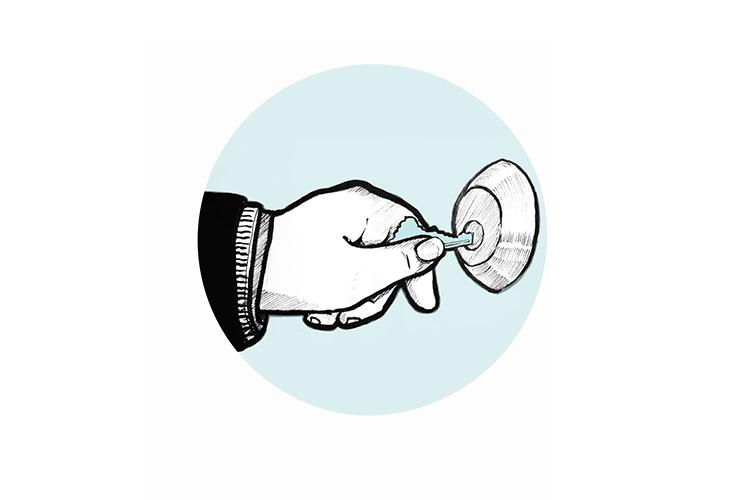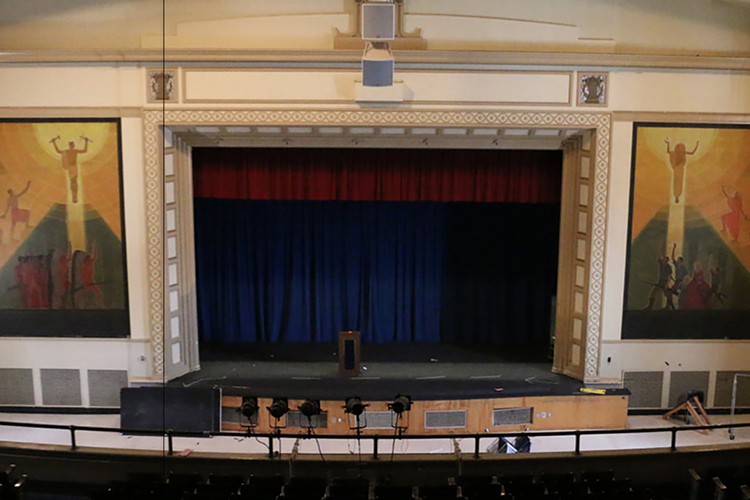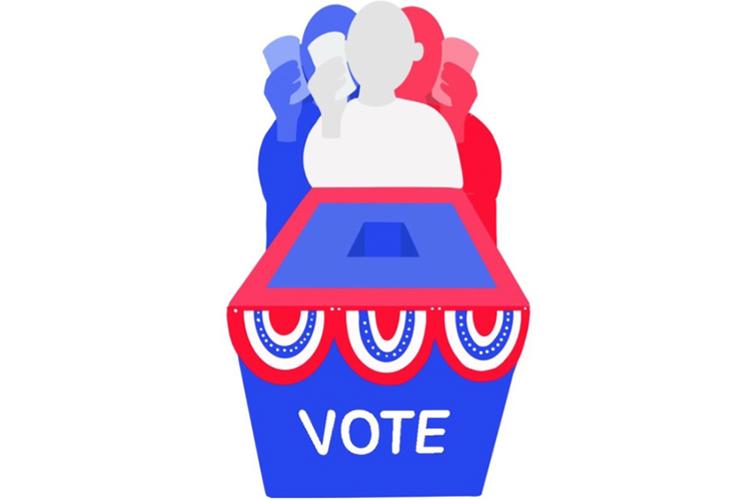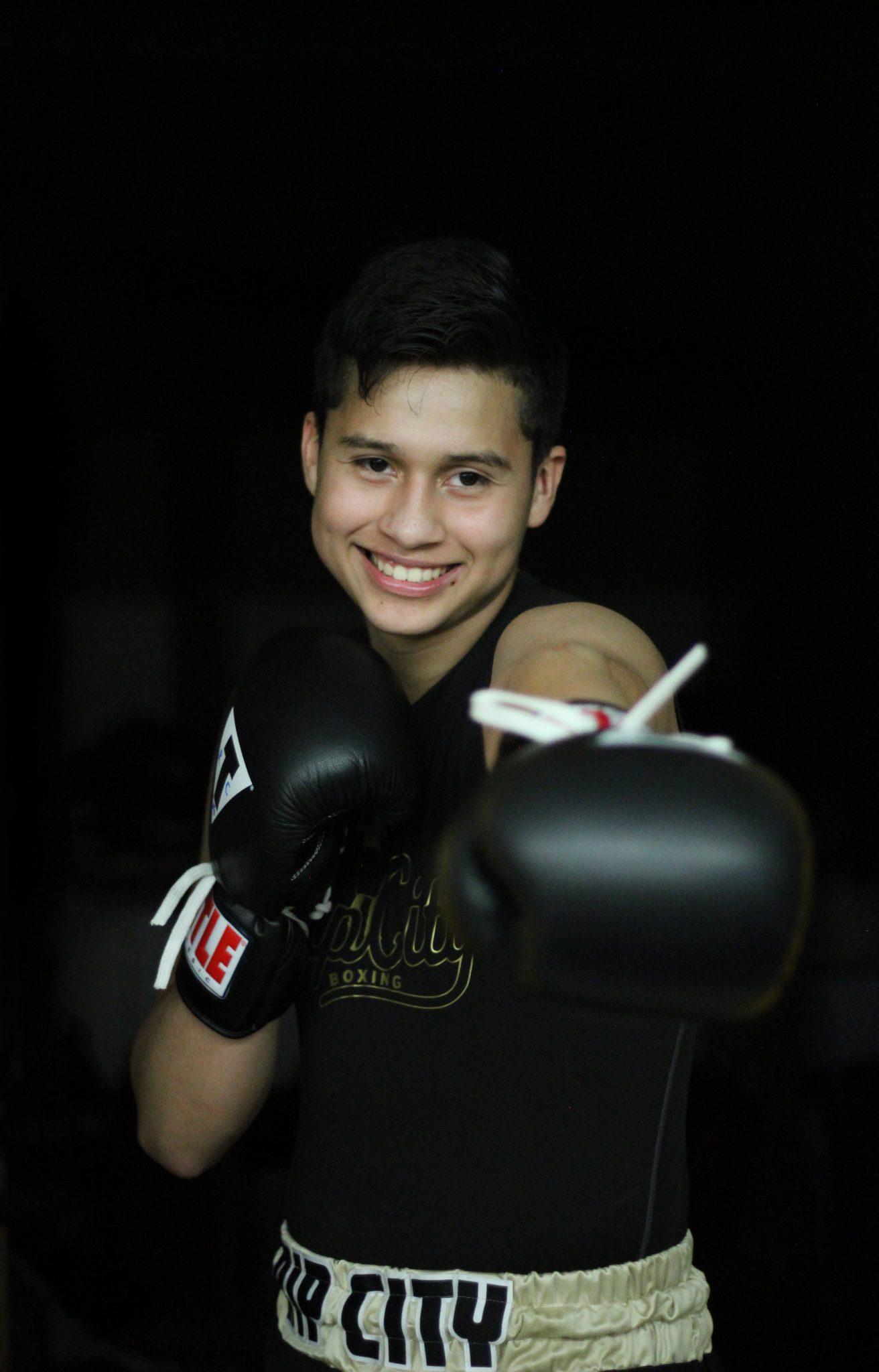
Nine-year-old Santiago Franco sits outside the boxing ring, dressed in a pair of silky yellow boxing trunks that reach well below his skinny knees. As his coach wraps Franco’s hands with long strips of white cloth and gauze, Franco shakes with nerves as the possible outcomes of his first fight race through his head — either he wins by beating his opponent, or loses by getting pummeled with punches. Bright fluorescent lights illuminate the room, casting a harsh glow onto the ring. The anxiety buzzing through his head turns to butterflies fluttering in his stomach as the moment nears. But as Franco steps into the ring, locking eyes with his opponent, everything becomes calm. He knows there is no backing out now; all he can do is fight.
The bell rings, and the boxers move in, wildly throwing jabs and dodging punches as best as they can at their young age. Over the din of the crowded gym, Franco hears his family — mother, siblings, cousins, aunts, uncles and grandparents — cheering him on. But he soon blocks out everything except for his coaches’ voices, including his father’s, yelling directions from his corner of the ring. Franco’s sole focus is on the other fighter in front of him. As the fight progresses, Franco grows increasingly confident. After each round, he turns to his corner and bangs his blue boxing gloves together, pumping himself up. “Tago’s gonna win, I know it,” Franco’s older cousin says from the side.
After the final bell rings, signaling the end of the match, Franco’s state of calm disappears, replaced by anxiety as he awaits the judge’s final decision. After a few
long and painful minutes, the referee calls the two fighters back to the center of the ring, facing the audience before taking their hands.
When the judge holds up Franco’s arm in indication of his win, his family’s whoops and whistles ring throughout the gym. Franco sees his grandma jump into the air, cheering his name along with the rest. As he climbs out of the ring, his father embraces him, eyes shining with pride. “You did it, man, you did it!” his father says. “All that hard work is paying off!” While his family crowds around him, tears slide down Franco’s cheeks as he feels overcome with emotion.
At first glance, Franco does not seem like the typical boxer. With a lanky, six-foot-two build, a combover and a shy, respectful demeanor, he contradicts nearly every stereotype that comes with the sport. “My dad’s told me before … ‘You know, if I were a kid and I see you, I would just expect you to be, like, a dork,’” Franco jokes.
Franco’s mother, Eloina Franco, says that as a child, her son was “very caring, fun-loving, just a good kid. Just a bright little boy who loved to play. He got along with everybody.” Despite this, Franco sometimes struggled with confidence. “I just used to be, like, a really quiet kid, and I still am, but not as quiet. I’m more vocal now,” he says.
During fights, weigh-ins and press conferences, many professional boxers can be seen taunting other fighters and showboating for the audience to assert dominance in the ring. Some boxers even go so far as to throw dirty punches at their opponents. Franco rejects these stereotypes and says that in professional boxing, fights are often over-hyped and money is prioritized over sportsmanship and respect.
Contrary to the stigma around professional boxers, Franco is far from arrogant. Throughout his time boxing, one of his biggest takeaways has been the importance of respect. “Respect is promoted a lot because you have to have respect for yourself and your opponent,” he says. Franco has learned to value respect and hard work from his father, James Franco, who also doubles as one of his coaches.
Franco considers boxing to be a sport of morals. He says that in the ring, if his opponents do not respect him, he knows they will not give him a good fight. “If you don’t get respected, people aren’t gonna treat you right … They’re gonna look down on you,” Franco says. “And I don’t need them to look up at me, but they’ll look me straight in the eye.” This desire for mutual respect has been enforced not only by his experiences, but by his father, who tells Franco to treat others how he wants to be treated, both in and out of the ring.
Along with this, his father has taught him to be humble. “There were always some kids that, like, bragged and he’d tell me … ‘Don’t brag. There’s no need to say anything … just be quiet and do what you have to do,’” says Franco.
Franco appreciates the accountability that comes with the sport. “With boxing, I like the fact that … everything you do in that ring is just you and him,” he says. “Everything that happens is your fault.”
But boxing is not just a sport to Franco. It is also a family tradition.
The sport is deeply rooted in his family’s Mexican-American culture and heritage. Franco says that through all of the hardships and injustices that Mexican-Americans have experienced throughout history, they had to fight. One way this manifested was through boxing. It served not only as a way to learn self-defense skills but also as a way to empower and strengthen their community. “My grandparents, and my great-grandparents, going down the line, they’ve always had their struggles,” says Franco. “They just never quit.” Growing up, the family motto, “Francos’ never quit,” was something Franco heard frequently.
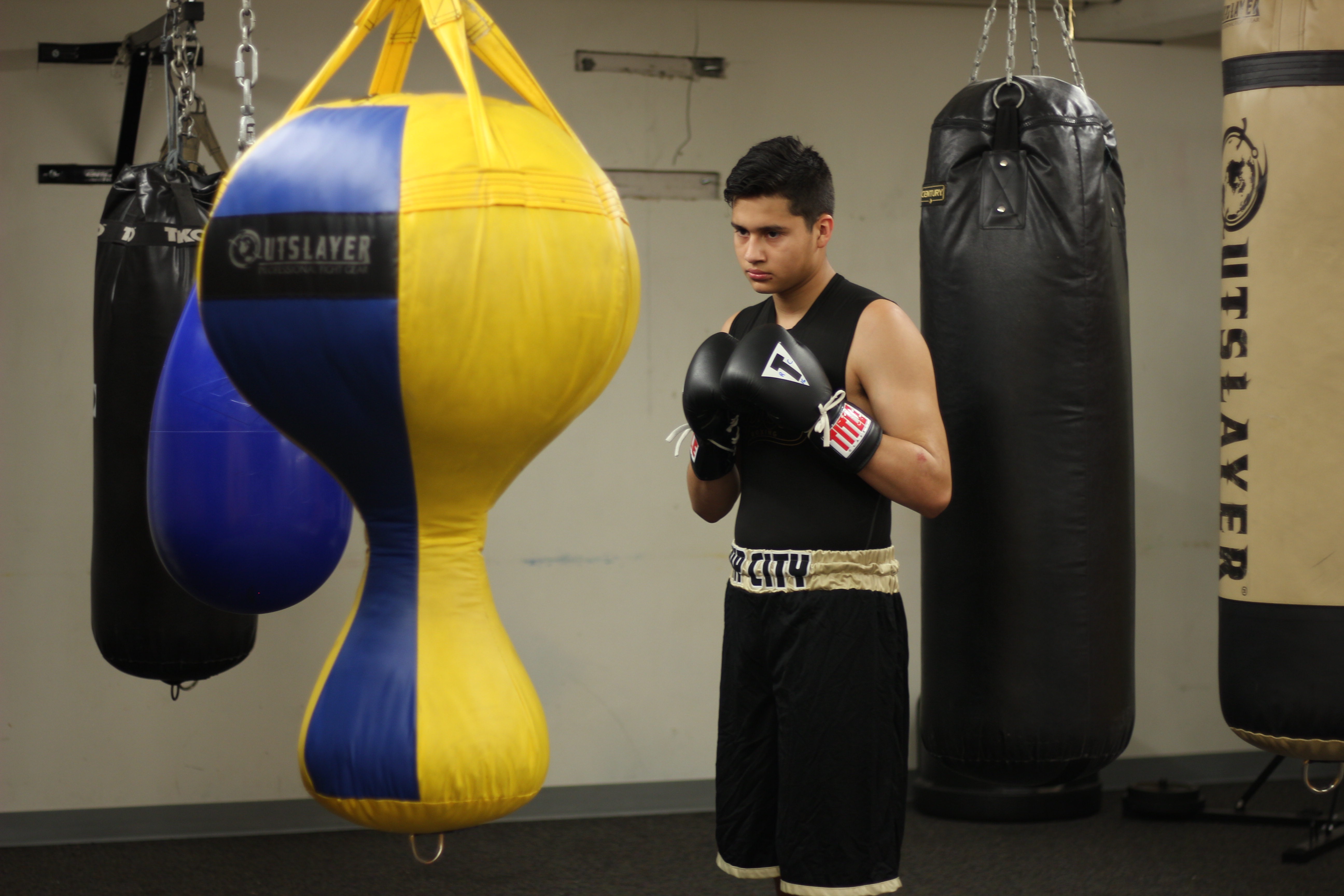
In the early 19th century, boxing was seen by many as a barbaric, uncivilized sport. Because of this, most boxing in Mexico was done illegally in underground fights. It wasn’t until 1921, when the first Mexican boxing commission was founded, that boxing was given rules and regulations, officially legitimizing it as a sport. In the years following, the popularity of boxing soared in Mexico. During the early 1900s, the Mexican Revolution brought the Mexican tradition of boxing to the United States.
Though the popularity of boxing has fluctuated through the years, boxing has consistently been one of the most popular sports in Mexican-American culture. Even with a recent decline in boxing viewership, Mexican-Americans account for a large portion of professional boxing’s audience.
The Mexican-American tradition of boxing has played an important role in Franco’s family history as well. In the 1940s, Franco’s great uncle, Domingo “Sunday” Franco, was a well-known boxer in Washington and Oregon who gained recognition in high school by winning three Washington state championships. He also continued boxing into the 1950s with a successful professional career. Santiago Franco’s grandfather, Refugio Jose Franco, and other great uncle, Manuel Franco, also dabbled in the sport. Though Franco’s father did not compete, he practiced some of the basics in his youth and had a general knowledge of the sport. Because of this, Franco grew up watching boxing on television with his family, and occasionally heard stories about his relatives’ experiences with the sport.
Franco grew up surrounded by family and cherishes the bonds he has made with them. Franco’s large family tries to come together each month to stay connected. At those gatherings, he fondly recalls play fighting with cousins and listening to stories from his family members.
Franco is especially close with his parents and siblings. While much of his family’s time is consumed with various sports practices and games, they like to come together in their free time to watch sports, particularly basketball.
When he was younger, Franco’s parents decided to put him into a number of sports — basketball, soccer and football — trying to find one that would stick. Because Franco’s father played basketball in his youth, Franco spent the earlier years of his life dedicated to the sport. But his parents wanted him to have something more to fill his time when he was not playing basketball.
The idea of Franco learning to box had always been on the back burner because of their family’s history, but whenever his grandfather or another family member mentioned boxing at family events, Franco brushed it off without further thought. Although Franco had grown up hearing the stories about his family boxing and watching it on television, he had never seriously considered trying it himself.
But when Franco finally expressed interest in boxing as an alternative to another year of football, his parents were nervous about the physical effects boxing would have on their then 9-year-old son. While Franco’s father soon accepted and encouraged his son’s interest in boxing, Franco’s mother was more skeptical. “Him boxing in general, I was a little hesitant about it,” she says. “The whole idea of, you know, getting hit in the head and the face and the body … it was a little scary.”
After some convincing from Franco’s father, who advocated for the potential positive impacts that boxing could have for their son, they decided to let him give the sport a try. They felt boxing would teach their son valuable lessons while giving him a way to use his excess childhood energy.
As he walked into the Knott Street boxing gym at Matt Dishman Community Center on his first day of training, Franco remembers feeling overwhelmed by the competitive atmosphere there. Boxers ranging from 9-year-old “pee-wee’s” to older boxers in their prime pounded red and yellow bags all around him, and coaches yelled directions to the boxers across the gym. As one of the youngest beginners, Franco was intimidated. “I see all these little kids my age pounding the bag, and I didn’t know the first thing about boxing,” he says.
During his first weeks of boxing, Franco was bored with the repetitiveness of training, spending hours a week shadow boxing in a mirror while he learned the basics of where to place his feet and how to throw a jab. “People don’t realize that you stand in the mirror, look at yourself and you punch yourself in the face,” Franco says.
When Franco began boxing at Knott Street, his father came to nearly every practice to watch his son’s progress but was not actively involved in training him. Franco was mostly trained by the head coach, along with other assistant trainers at the club. But after a few months, Franco’s father decided he wanted a more official role in his son’s coaching. With no coaching experience, he learned how to train young boxers by watching Youtube videos and contacting other coaches for advice.
As the weeks progressed, Franco’s training became increasingly difficult. After learning the basics, he moved on to more advanced punches and footwork, as well as using a punching bag. Franco was nervous to start sparring, thrown off by the thought of getting a fist to the face. On the day of his first sparring match, Franco remembers talking with another beginning boxer at the gym when one of his coaches yelled, “Santiago! Get ready to spar!” The young boys, both having never sparred before, looked at each other, eyes wide, and began putting on gloves and headgear.
During the match, Franco leaned away and threw punches wildly, trying to avoid the jabs of his teammate. But when his friend’s fist connected with his face for the first time, a wave of shock rippled through Franco’s body. With flailing punches still raining down on him, Franco swung over and over, trying to defend himself. Even weeks after his first sparring match, Franco still had not adjusted to the sensation of being punched, and he remembers crying daily.
At first, committing to the intense training that boxing requires was a challenge. Franco recalls being lazy as a kid, preferring to play video games rather than practice, so finding the motivation to train was a struggle. Boxing also began to take up most of his free time, and it was hard to balance both boxing and basketball. Franco recalls his friends asking him to hang out and having to respond with a frustrated, “Nah, I gotta practice.”
After winning his first fight, Franco lost two matches in a row. He became discouraged and considered quitting, but his father persuaded him to stick it out for a few more weeks, telling him that he had too much potential to just give up. Franco says, “My dad was like … ‘You gotta keep going cause there are a lot of kids that are better than you … but they’re plateauing … so you keep working and you keep correcting your mistakes. You’re gonna be better than them. You just need to wait, take your time.’”
Encouraged by his father, Franco continued to train, and eventually, all of his hard work paid off when he went on a ten-fight winning streak. This boosted his confidence and finally allowed him to be excited about boxing. “As I kept doing it, I started to get in better shape, and I started noticing it too,” he says. “I was getting better.”
As Franco improved, his priorities started to shift away from basketball and more on boxing. He enjoyed basketball and had a natural skill for it, but as he began competing in tournaments regularly, Franco no longer had enough time to do both. After a year of juggling the two sports, Franco decided to drop basketball so that he could focus more on becoming a better boxer.
Franco spent the first four years of his boxing career at Knott Street Boxing, where he formed close friendships with many of his teammates. Though boxing is an individual sport, spending hours a week in the gym together bonded Franco and the other boxers. “We do everything together,” he says. “We have respect for each other because we all do it, no complaining. We just get it done.” Franco now considers his boxing teammates some of his closest friends.
After a coaching conflict, Franco left Knott Street Boxing. Though many of his teammates joined Franco and his father in leaving the club, it was still hard for Franco to leave the community that they had formed there. “At first it was tough because I’d been there for four years and … I’d workout there every day, it was kind of like home,” Franco says. “I had friends over there, like the workers at Matt Dishman, they’d always be like, ‘Hey Santiago.’ Everyone knew my name.”
Franco’s father led the charge in forming a new club, Rip City Boxing, which is currently one of the top boxing clubs in the Pacific Northwest.
Now, six years after starting his boxing journey, Franco trains for two hours nearly every day of the week. While at one point Franco’s father had to push him to work harder, Franco now takes more initiative in his training. “I think he just understands what he needs to do,” his father says. “I don’t even have to tell him to do it anymore.”
When not training in the gym at Rip City Boxing, Franco practices his technique on the punching bag in their basement or wakes up early to get in a run before school. He does all of this to keep up his reputation of being the two-time boxing national championship winner. Now fifth in the nation for his weight class, Franco is working to be number one nationwide. “It’s something that I think he’s got a passion for,” says his father. “Because who doesn’t like to be known, you know?”
Franco’s passion for boxing is evident. “When I’m fighting — see I’m making a fist just thinking about it, I don’t even mean to — but when I’m doing it, I just feel calm,” says Franco. Learning to fight and push through the pain that comes with boxing has given Franco a confidence in himself that wasn’t there before.
“Boxing, it challenges you in so many ways, so it’s not only physical, it’s also mental,” says his mother. “I see it as a way of preparing him, or any other boxer, for anything that they come across.” While his mother was nervous about Franco boxing at first, she has seen the benefits it has had for her son, and recognizes his love for the sport. “Just seeing him overcome different obstacles and challenges, not only in boxing itself but also outside of (it) … For that reason, I support it wholeheartedly.”
Franco feels that without his family’s strong support, he would not be where he is today. His parents travel with him to tournaments all over the nation, and his siblings and other family members come to support him at many of his local matches. Franco’s father has been along for the ride since the beginning, and his encouragement towards Franco has never faltered.
Though Franco and his father have always been close, being coached by his father has strengthened their bond in a whole new way. “He’s always been my hype man,” says Franco. “Usually before a fight you sit on the stairs to get into the ring first. (He’s) rubbing my shoulders, and he’s in my ear he’s like, ‘You’re the best, no one here has the skill you have, you’re gonna get this guy, he has no reason to be in the ring with you.’”
As head coach at Rip City Boxing, Franco’s father now has a smaller role in personally training his son than he did in the beginning. Still, Franco attributes much of his success to his father, who always pushed him to go the extra mile in his training.
During fights, his father is in his corner, lending support and guidance. As he did in his very first fight, once Franco steps in the ring, he gets into his zone. Calmness washes over him, and the only thing that matters is him and his opponent. His body automatically knows what to do, and he reacts using instinct as well as his father’s voice in his ear. “I listen to him, but everything else is silent,” Franco says.
In between rounds, he looks to his father for advice. “I just walk back to my corner, and there’s my dad,” he says. “I trust him. I trust him 100 percent.”
Outside of the gym, Franco is a gentle and playful person, but when he boxes, his confidence bursts out as he pounds the bag with a focused intensity. He moves with agile power as his coach runs him through mitt drills. Dripping with sweat, face contorted in ferocity, it is as if he has been transformed. But when the drills are done, Franco cracks a smile and fist bumps his coach. Then he turns to help a younger boxer tie his gloves.
From his parents to his coaches, to his classmates, to the receptionists at the front desk of the community center where his boxing gym is located, the admiration for Franco is unanimous. His personality shines in a unique way, so bright that people go out of their way to describe what a genuinely good person he is.
Though Franco doesn’t know yet if he wants to continue boxing as a career, he wants to make sure that the tradition of boxing in his family is maintained in the generations to come. “I want to pass the torch to my kids and my brother,” he says. “If I have a son, I would try to get him into boxing.” Just as Franco was as a kid, his seven-year-old brother is currently focused on basketball. But Franco says, “I’d love to train him. Whenever he wants to do it … I want to see my brother be better than me.”
But more than anything, Franco wants to make his family proud.
“I go into the corner and I look and I see my family, and I see my little brother and he’s like, ‘Go! Go, Tago!’ I’m like, I have to give it everything ‘cause, you know, they’re there watching. And I don’t want to disappoint them.”






























